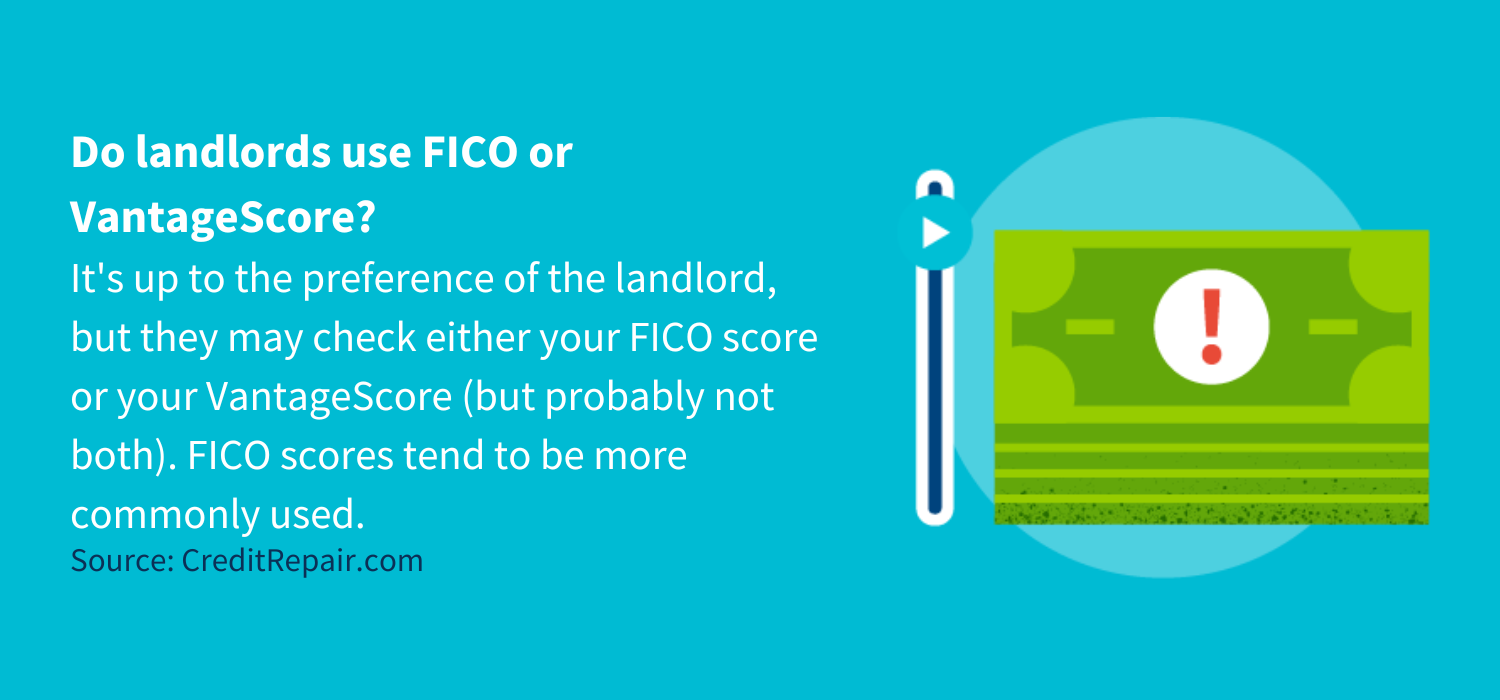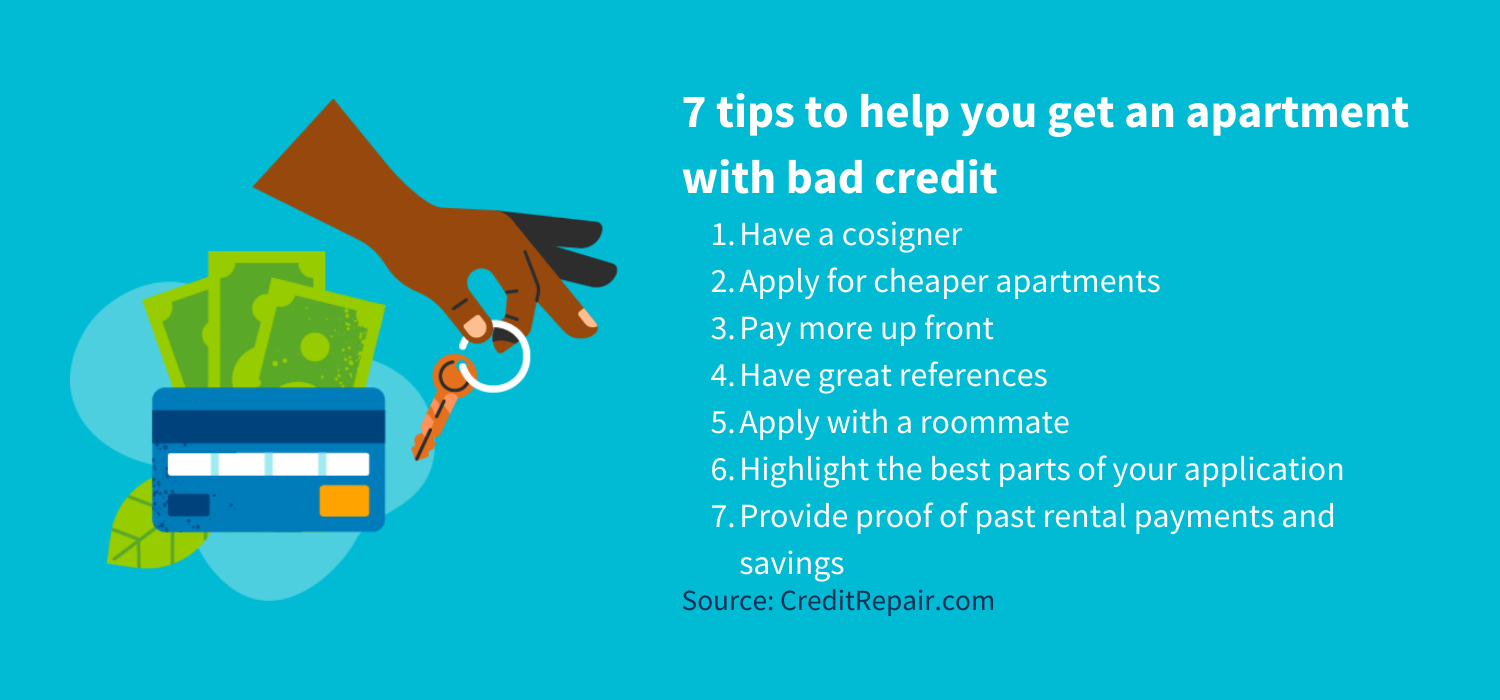
Disclosure regarding our editorial content standards
Whether you’re looking for your first apartment or a new place in a new town, apartment hunting can be a thrilling, hopeful process. But it can also be a little scary. The last thing you want to worry about when finding your dream apartment is whether the landlord will reject your application due to your credit.
The simple fact is, landlords want to make sure they’re not taking a risk on a tenant—and the quickest way to weed out a tenant who’ll have trouble making rent is by checking the applicant’s FICO® or VantageScore®.
But even if you have less-than-stellar credit, don’t despair. There are plenty of ways to assure a landlord that you’re still a good bet, even with credit that isn’t great—and if all goes well, pretty soon those apartment keys will be dropped into your hand.
What do landlords see when they look at your credit report?
There’s a great deal of information listed on your credit report that’ll help a landlord determine whether you’d be a risky tenant. While some landlords might just look at your credit score to decide whether to accept or reject your application, a good landlord will evaluate what the report says to see the bigger picture beyond just a simple credit score number.
Like anyone who pulls your credit report, the landlord will see your whole credit history, including credit card balances, outstanding loans, late payments, any bankruptcy and of course, the credit score itself.
Do landlords use FICO or VantageScore?

It’s up to the preference of the landlord, but they may check either your FICO score or your VantageScore (but probably not both). FICO scores tend to be more commonly used.
What are the good items landlords want to see?
If a landlord sees you have a very good to exceptional credit score, you’re off to a good start towards having your rental application accepted.
Beyond the credit score, a landlord will want to see a favorable debt-to-income ratio, credit card accounts and loans (such as a car loan) that are paid on time along with a stable employment history.
What are the bad items landlords look out for?
A credit account you’re late on paying, you’ve failed to pay or that’s gone to a collection agency is a red flag for a landlord. Other red flags are wage garnishments, liens and bankruptcy.
Another concern would be if your credit report lists a previous landlord to whom you still owe money or who reported to credit bureaus that you were more than 30 days late paying rent.
What credit score do you need to rent an apartment?
Although there’s no set credit score you need to rent an apartment, a score above 600 is what most landlords look for. However, Chris Fluegge, Director of Operations at the National Landlord Association, says many landlords take a bigger-picture approach that goes beyond just the credit score.
“Most landlords understand that a comprehensive credit report is more important than a credit score because it’s a better indicator of a tenant’s payment history,” Fluegge says. “One bad hospital bill or a case of identity theft can send a credit score plummeting. But if that’s the only blemish in a long credit history, the risk is minimized.”
What are the credit score ranges?
FICO and VantageScore use slightly different ranges in classifying their credit scores:
FICO (scale of 300 to 850)
- Excellent: 800 – 850
- Very Good/Good: 740 – 799
- Good/Fair: 670 – 739
- Fair/Poor: 580 – 669
- Poor/Very Poor: 300 – 579
VantageScore (scale of 300 to 850)
- Excellent: 781 – 850
- Very Good/Good: 661 – 780
- Good/Fair: 601 – 660
- Fair/Poor: 500 – 600
- Poor/Very Poor: 300 – 499
7 tips to help you get an apartment with bad credit
If you’re in a position where you’re worrying that your credit score isn’t good enough to land an apartment, you don’t have to freak out. Even with suboptimal credit, there are ways to convince the landlord you’re a solid bet as a tenant—and barring that, there are ways to find an apartment that’s better suited to your credit history.

Have a cosigner
Using a cosigner (also known as a guarantor) is one of the best ways to secure an apartment with bad credit. By pairing up with a cosigner who has good credit and a reliable income, you’re more likely to have a landlord consider you less of a risk. If you fail to pay your rent, your cosigner is responsible for paying it.
Having a parent as a cosigner is a common way for people who have little credit history—such as someone graduating college and moving to their first apartment—to have their rental application accepted.
Apply for cheaper apartments
If you find yourself applying for several apartments and striking out, you may need to start looking for apartments with less expensive rents; naturally, the higher the rent, the harder it will be to secure a lease when you have less-than-great credit.
Pay more up front
If you can put down more cash up front, it’ll go a long way in overcoming concerns about your credit history. You may want to proactively suggest paying as much as three months of rent up front to allay concerns about bad credit.
Have great references
Just because you don’t have great credit doesn’t mean you aren’t currently on good financial footing. One of the best ways to prove this to a landlord is with one or more letters of reference.
If you’re comfortable asking your employer to write you such a letter, that’s a good step to take. Another excellent option would be a letter from your current landlord stating that you’ve been a responsible tenant. Make sure you get the landlord to put down in writing that you always paid your rent on time.
Apply with a roommate
Coming into a lease application with a roommate goes a long way toward assuring a landlord that they’ll receive the rent. Similar to applying with a cosigner, it means two people would be on the hook for the rent.
Highlight the best parts of your application
Emphasize positive aspects of your application, such as the ability to use a cosigner if needed or your long employment history.
Similarly, being open about any flaws in your credit report goes a long way towards establishing trust with a potential landlord. If there’s a good explanation for why you missed some credit card payments one year—perhaps you got laid off but are now gainfully employed or had a health emergency—explain this to the landlord.
Don’t forget that while landlords want to make a safe bet, they’re people, too. Like all people, they’re capable of empathy.
Provide proof of past rental payments and savings
A bank statement for a checking or savings account showing funds equal to several months of rent can reassure a landlord.
Whether or not you have savings to show a landlord, you should show proof of past rent payments. Of all the things a landlord wants to see in an applicant, there’s probably nothing more important than a history of paying other landlords on time.
How to work on your credit before applying
Before you apply for an apartment, make sure you’re paying your credit cards and loans on time, not over-utilizing your lines of credit, monitoring your credit report and making corrections to it should any mistakes appear.
Applying for a rental apartment is a good reminder that improving your credit is a continual, important process. Credit Repair can help with this process to easily and conveniently improve your financial health.
Having good credit is important for almost all aspects of your financial life and will become especially important one day if you decide to make the move from being a renter to investing in the biggest life purchase of all: your own house.
Note: The information provided on CreditRepair.com does not, and is not intended to, act as legal, financial or credit advice; instead, it is for general informational purposes only.
Questions about credit repair?
Chat with an expert: 1-800-255-0263






